Defense Minister Mario Banožić: Problem of Substance Abuse Among Military Personnel Under Scrutiny
ZAGREB, 28 July, 2021 - Defence Minister Mario Božinović said on Wednesday the Croatian Armed Forces had zero tolerance for drug abuse, and in the context of the latest drug abuse cases, the minister announced stricter control and disciplinary measures aimed at reducing drug abuse to a minimum and protecting the reputation of the Croatian Armed Forces.
Speaking to the press ahead of an inner cabinet meeting, Banožić said that in accordance with the Drug Abuse Prevention Act, the military police were implementing emergency control measures.
He confirmed that along with the four soldiers who had tested positive for drugs in early July, another three soldiers tested positive for illegal substances last Friday while one more soldier tried to avoid testing.
A total of 30 soldiers in barracks in Split, Ploče, Udbina, Delnice, Vinkovci and Velika Gorica have been tested so far and drug testing will continue.
The minister expects everyone in the Armed Forces to make joint efforts to prevent drug abuse, announcing a set of measures to deal with this problem.
Banožić said the military police were still investigating recent suicide cases in the Armed Forces and that the public would be notified of the results of the investigation in due course.
The minister also announced increased counselling for members of the Armed Forces.
For more about politics in Croatia, follow TCN's dedicated page.
Supreme Court upholds sentence for Briton convicted of Zrće murder
ZAGREB, 26 July, 2021 - The Croatian Supreme Court has dismissed an appeal by British national Douglas Cane, upholding a ruling sentencing him to 24 years in prison for murder and attempted murder at the Zrće beach on the northern Adriatic island of Pag in June 2018.
Without revealing the identity of the accused, the Supreme Court said that the sentence by the appellate court was appropriate given the accused's profile and the circumstances of the crime.
The Supreme Court said that the sentence was neither too harsh nor too lenient, recalling that Cane was sentenced to 17 years in prison for murder and to eight years for attempted murder and that he was given a combined sentence of 24 years.
The court cited his earlier convictions in the UK and his attempt to flee Croatia after the crime. He had shaved his head in an attempt to disguise his identity, police said at the time.
Early in the morning of 27 June 2018, after an argument with three persons, Cane attacked and stabbed Briton Ugo Wilson to death. The other victim, also a Briton, rushed to help Wilson but Cane stabbed him as well, using a sharp object resembling a knife. The man was rushed to the hospital and survived.
The media said at the time that it was most likely a showdown of drug dealing gangs.
For more about news in Croatia, follow TCN's dedicated page.
Zagreb Gay Pride 2021 Analysis: Issues Still Exist, Pride Celebrates History and Present Equality
July 5, 2021 - Gay rights in Croatia still have challenges ahead, but even if all problems are resolved, Pride should remain a commemorative event. A look at the history of gay culture in Croatia and the current climate in this Zagreb Gay Pride 2021 Analysis by TCN reporter Ivor Kruljac.
Zagreb Pride is the oldest pride in Croatia. First held in 2002, it attracts more and more people every year, from LGBTQ members, straight people that support gay rights to NGOs, human rights activists, and even politicians from the left and liberal specter. Over the years, the event grew from a one-day pride to Pride month, full of educational and entertaining events regarding LGBTQ issues and a chance for people with the same preferences to meet and celebrate who they are.
Pride month is marked in June in honor of the 1969 Stonewall Uprising in Manhattan.
„The Stonewall Riots, also called the Stonewall Uprising, began in the early hours of June 28, 1969, when New York City police raided the Stonewall Inn, a gay club located in Greenwich Village in New York City. The raid sparked a riot among bar patrons and neighborhood residents as police roughly hauled employees and patrons out of the bar, leading to six days of protests and violent clashes with law enforcement outside the bar on Christopher Street, in neighboring streets, and in nearby Christopher Park. The Stonewall Riots served as a catalyst for the gay rights movement in the United States and around the world“, reminds History.com.
When it comes to LGBTQ in Croatia, as you can expect with the ideological divide Croatians generally experience, there are mixed feelings on the issue.
From street violence to a family event
Participating in the first Pride in 2002 required that if you are a man loving a man ready to openly admit it, you had to have balls.
The attacks by skinheads and other „morally concerned citizens were fierce and violent. Participants truly needed police protection which was provided but also needed to be careful to not get hit by the incoming rocks that were thrown among the participants.
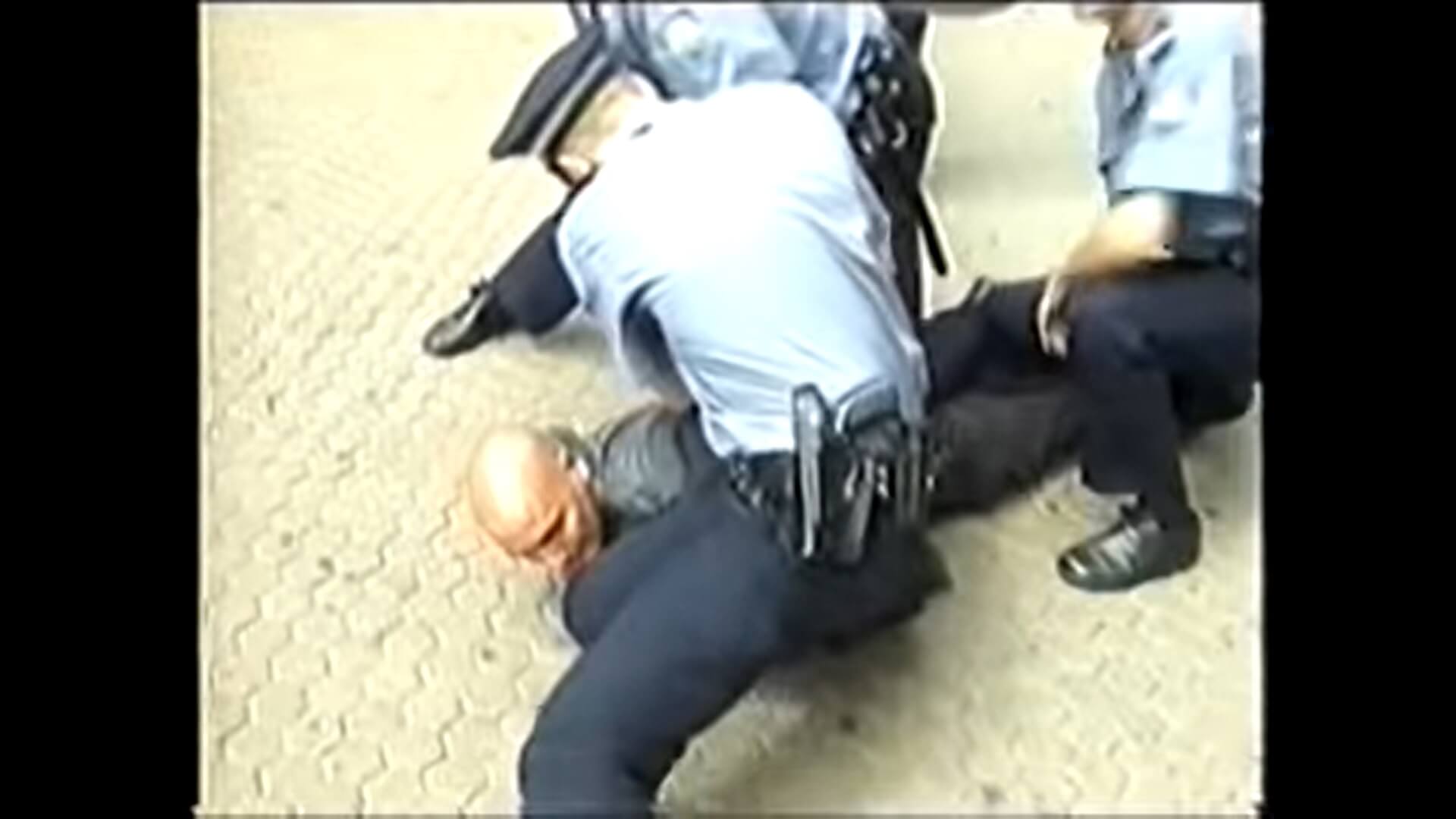
Police arresting violent skinhead at the first Zagreb Pride in 2002, screenshot / Zagreb pride
But, at least for Zagreb, the situation got better and more open. Today, pride is the forthcoming celebration of love and freedom, and entire families can be seen to join the picnic at Ribnjak park to teach their children tolerance and that people are not sick or different from others because of their sexual preference. Other larger cities in Croatia, such as Split, slowly but surely, do follow that path too, and Rijeka, the pinnacle of liberal Croatia, is also a very gay-friendly city.
Of course, a political counterstrike is expected and quite strong. The first most notable one was the 2013 referendum, where it was voted that the Croatian constitution declares marriage as a „community between a man and woman“. The goal was to deny LGBTQ couples the same rights as enjoyed by straight people.
However, the bill on life partnership outplayed that attempt.
In the meantime, LGBTQ couples can also adopt children in Croatia, as Constitutional Court concluded that gay couples fostering children is not against the Croatian Constitution.
That decision and along with the general openness of Croatia towards LGBTQ was followed by a controversial carnival in Imotski where an effigy of a gay couple was burned. President Zoran Milanović demanded an apology from the organizers, and SDP's MP Arsen Bauk filed charges against the organizers.
Counting pluses and minuses, the report on Croatia being the 39th best country for LGBTQ visitors still seems to uphold. No changes for the better, but at least Croatia is still in the top third for this category of tourists.
Haters strike back
2020 and 2021 sadly saw the uprise of violence towards LGBTQ in the Croatian capital. Apart from the occasional tearing down or burning of the rainbow flag, Croatia was shocked with an attempt of burning a man in Maksimir Forest Park as well, with his sexual preference being the sole motive for the attack.
On the other side, this year's pride felt to start stronger than ever. The newly elected mayor Tomislav Tomašević joined the parade, along with stating that Zagreb is a city that is open to everyone. This year arranged a bit differently to adhere to corona measures; around 2500 participated in the event.
„Twenty of our prides made our city and our republic a better, more democratic, and joyous place for the life of all citizens“, was the main message of the 20th edition of Zagreb Pride.
As reported by Index.hr, the Zagreb Pride association representatives stated that the Croatian LGBTIQ community „became a powerful, responsible and self-aware part of the country, but that the fight isn't over“.
„Our constitution and our laws still do not include in a complete and fair way. Our streets and squares are still not free of hate. We didn't forget nor we will forget victims of homophobic and fascist rampage in this year and all previous years“, stated Zagreb Pride.
Sadly, while Pride itself went without issues, participants of the pride who walked the streets of Zagreb after pride with rainbow flags faced a series of physical attacks on several locations in Zagreb.
A week ahead of Pride, conservative MOST Party parliament member Nikola Grmoja complained that commercials displayed during EURO 2020 commercials were LGBTQ propaganda and that kids need to be protected from it and announced that he might include it in his anti-pedophile package. Grmoja's statement caused strong disagreements among the Croatian public, with several people (including celebrities) teasing him that if he wants to start battling pedophilia, he should start from church (as Grmoja is quite clerical). Božo Petrov, president of the MOST party, added more fuel to the fire when he supported Grmoja, stating that „minorities can't dictate what my children can learn in school“. He added that minorities need to be aware that they are minorities and that „we tolerate that," sparking more enrage from the public, with many comparing MOST to the controversial Hungarian Prime Minister Viktor Orban.
Zagreb Pride linked the post-Pride physical attacks with Petrov and Grmoja's public statements, and Petrov and Grmoja announced they would sue Zagreb Pride for slender.
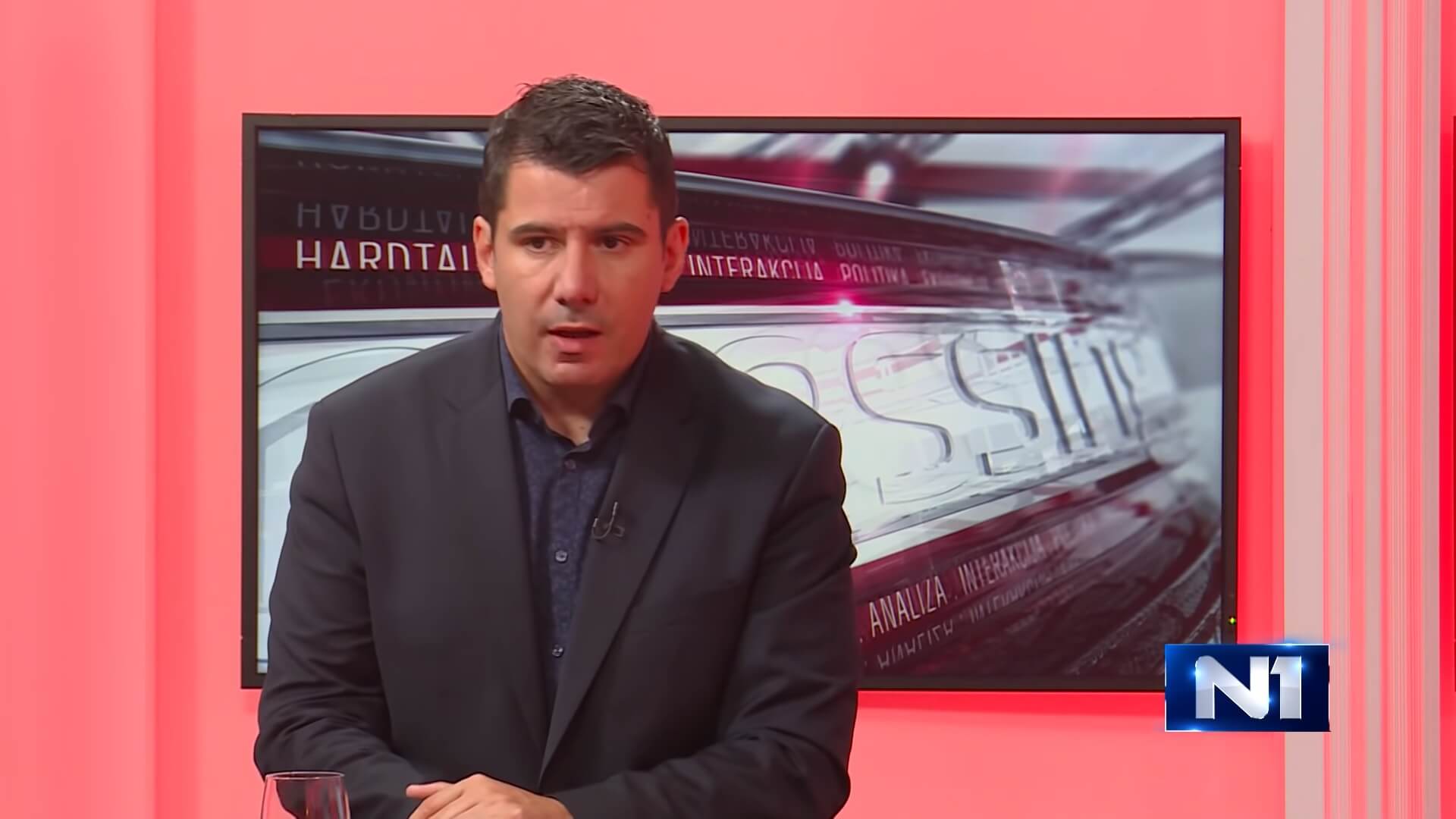
Nikola Grmoja, screenshot N1
The Law: "Gay is OK". Popular opinion: "Do it in your homes, not on the streets".
In this political escalation, what does the average Croatian think? Looking at the comments on social networks, it seems the majority of Croatians don't mind gays being gays and living how they like (even if they are not always happy with legal rights the LGBTQ community received). But, one sentiment in that „tolerance“ is particularly worrying.
„Live in your house however you want it. You don't have to wave around, like its a best thing ever“, said one of the online comments on Index.hr beneath the news on Petrov and Grmoja.
So it seems the public does not understand why Pride is important. First of all, as evident, the political climate is such that the battle for equality truly isn't over in Croatia, and Pride is the best way for the community to express what issues LGBTQ still face in Croatia. Additionally, pride month is also educational and supportive, and public presence show to other people who feel the same that they are not alone, as they might feel lonely and unable to find people who feel the same in everyday life.
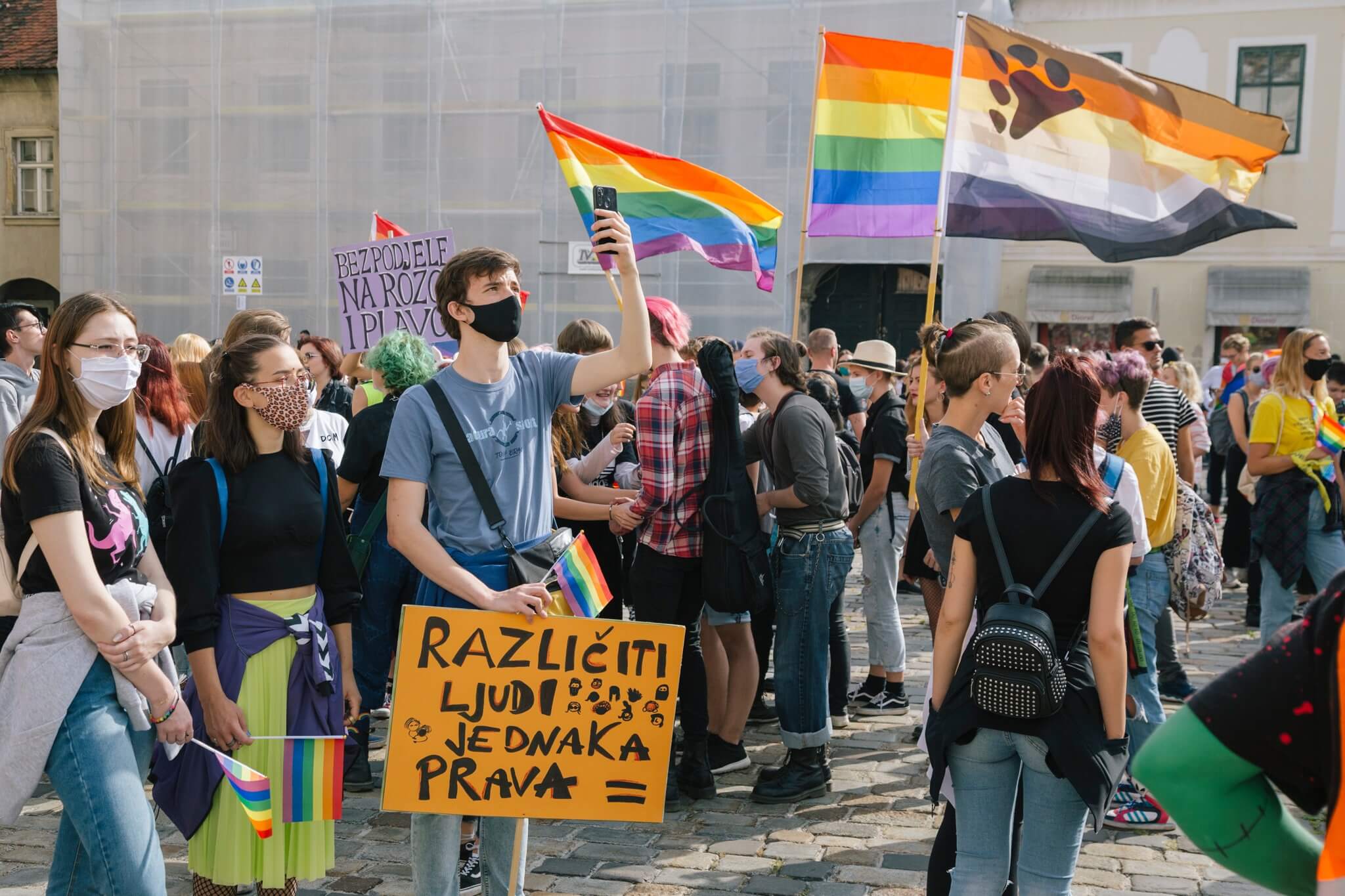
© Zagreb Pride
But, even if the law and constitution give the same rights and solves the problem of intolerance of LGBTQ people completely, does that mean that Pride should then be canceled? Well, Croatia won its independence and the war in the nineties. Does that mean we should stop commemorating the Homeland War? Or is it nice to honor and celebrate the victory and triumph over all obstacles Croatia had to face in its independence? Pride is a cultural, commemorative event honoring those who were or still are victims and oppressed for their sexual preference, either in Croatia or in the world. Croatia is a democratic country. Every group, national, ethnical, racial, religious, etc. should have the right to gather and honor its heroes. The right to gather and honor its tragedies and their dates and connect with other people who feel the same. If political elites are so concerned with keeping Croatians in Croatia, then they can't afford to discriminate or attack part of Croatian society solely based on their sexual preference. A preference that, unlike being violent or intolerable, can't be chosen.
Learn more about LGBT rights in Croatia and what LGBT tourists should know on our TC page.
For more about LGBT in Croatia, follow TCN's dedicated page.
Highlights of the Week: 5 Big Events in Croatia from June 28-July 4
June 3, 2021 - TCN's highlights of the week. A look at the events in Croatia from June 28 through the selection of TCN's reporter Ivor Kruljac.
EURO 2020 elimination and Dario Šarić in the NBA finals. Zagreb witnessing a series of arrests related to corruption of Milan Bandić's reign and explosive device planted in Split. In the midst of it all, is COVID-19 vaccination on its way to becoming obligatory and not optional? You may prefer the good news or the bad news, but here is both, as another week in Croatia comes to an end.
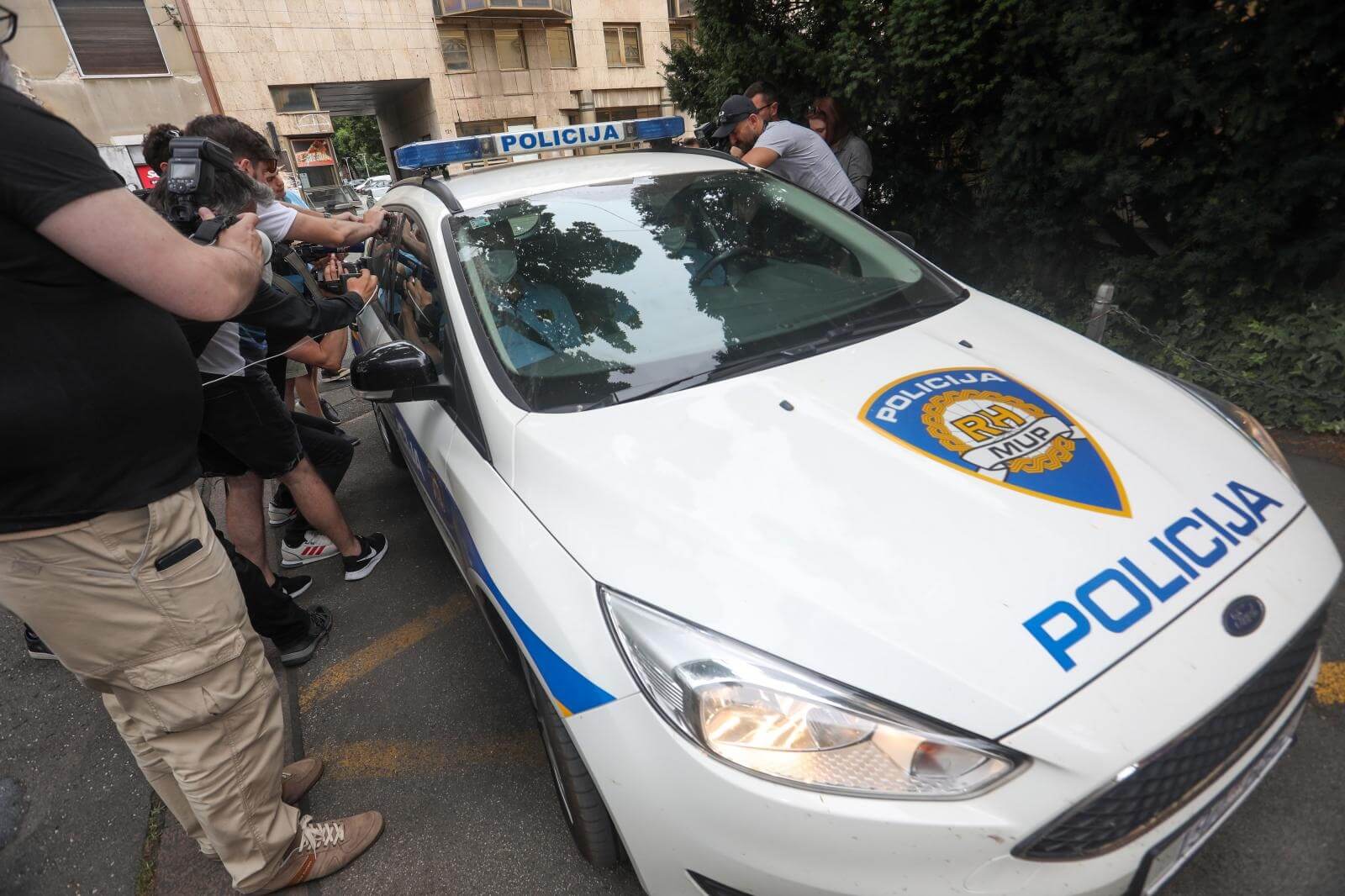
© Marin Tironi / PIXSELL
Highlights of the week: Uskok arresting Zagreb entrepreneurs and associates of former mayor Milan Bandić
The Office of Zagreb Mayor Tomislav Tomašević said on Wednesday that a preliminary investigation by members of the Office of the Chief State Prosecutor and the Office for Suppression of Corruption and Organised Crime (USKOK) started at the city administration offices at 6 am on Wednesday.
As TCN wrote, several people were arrested on suspicion of corruption, including the director-general of the HRT public broadcaster, Kazimir Bačić, Andrea Šulentić, and Ana Stavljenić-Rukavina. Both Šulentić and Rukavina were directors in Zagreb administration offices and close associates of former mayor Milan bandić. At the same time, details Bandić's heavy corruption (suspected and known publicly earlier) came to light.
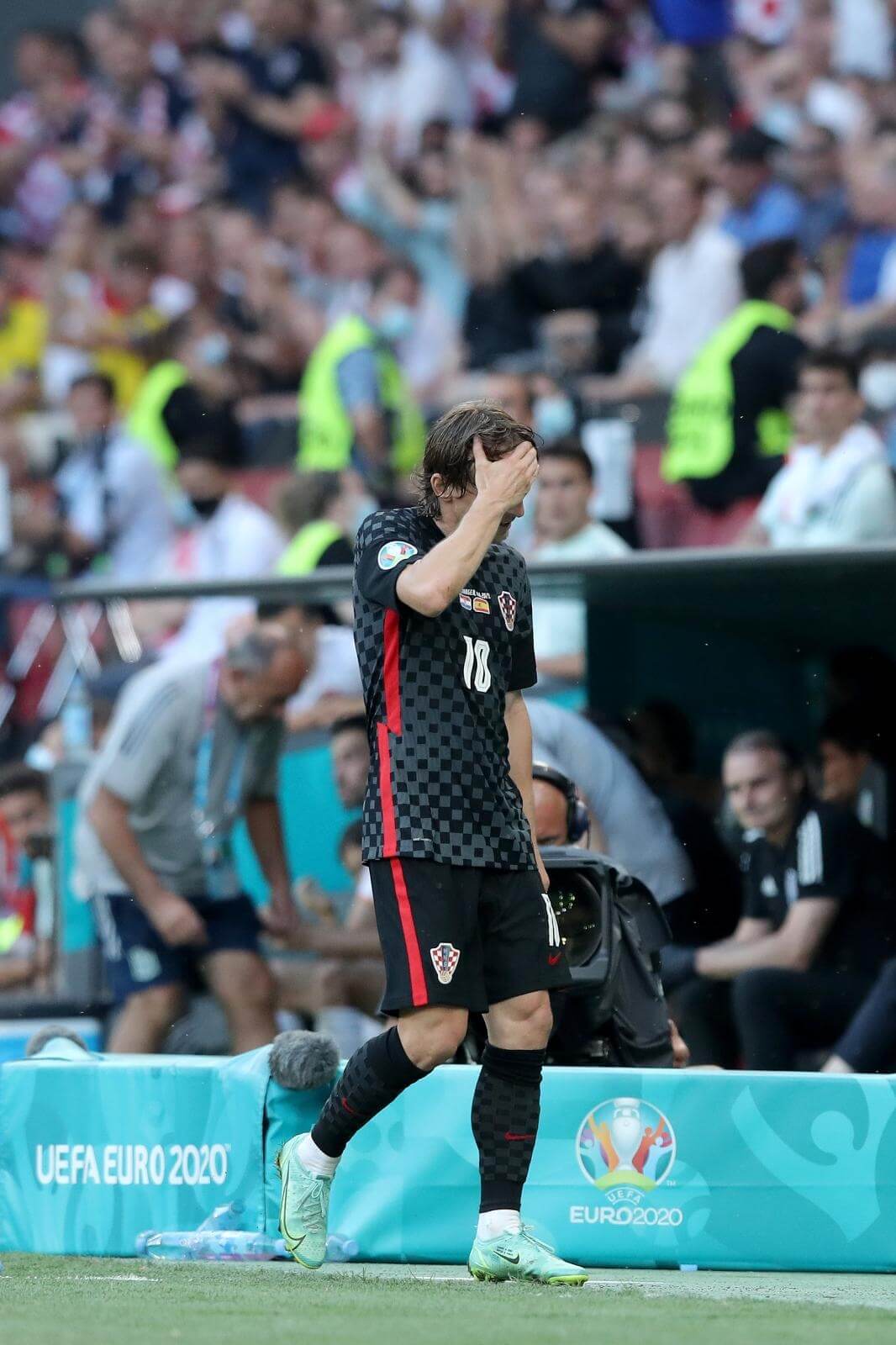
© Goran Stanzl / PIXSELL
Highlights of the week: Croatia eliminated from Euro 2020 after losing to Spain
Croatia and Spain met in Copenhagen on Monday for their EURO 2020 round of 16 match. It was a decent effort from Croatia, but not enough. Despite the Spain own goal in the 20th minute, the distraction as Rebić went to change his boots saw Spain even the score. The score towards the end of regular time went to 3:1 for Spain, but Croatia managed to lower to 3:2 and finally, in the added time, Pašalić scored for 3:3.
But, the euphoria was ruined for Croatia as in extra time, Morata earned Spain 4:3, and by 103rd minute, the total and final score was 5:3 for Spain. It was one of the more intense games on Euro so far as both teams show incredible spirit and persistence.
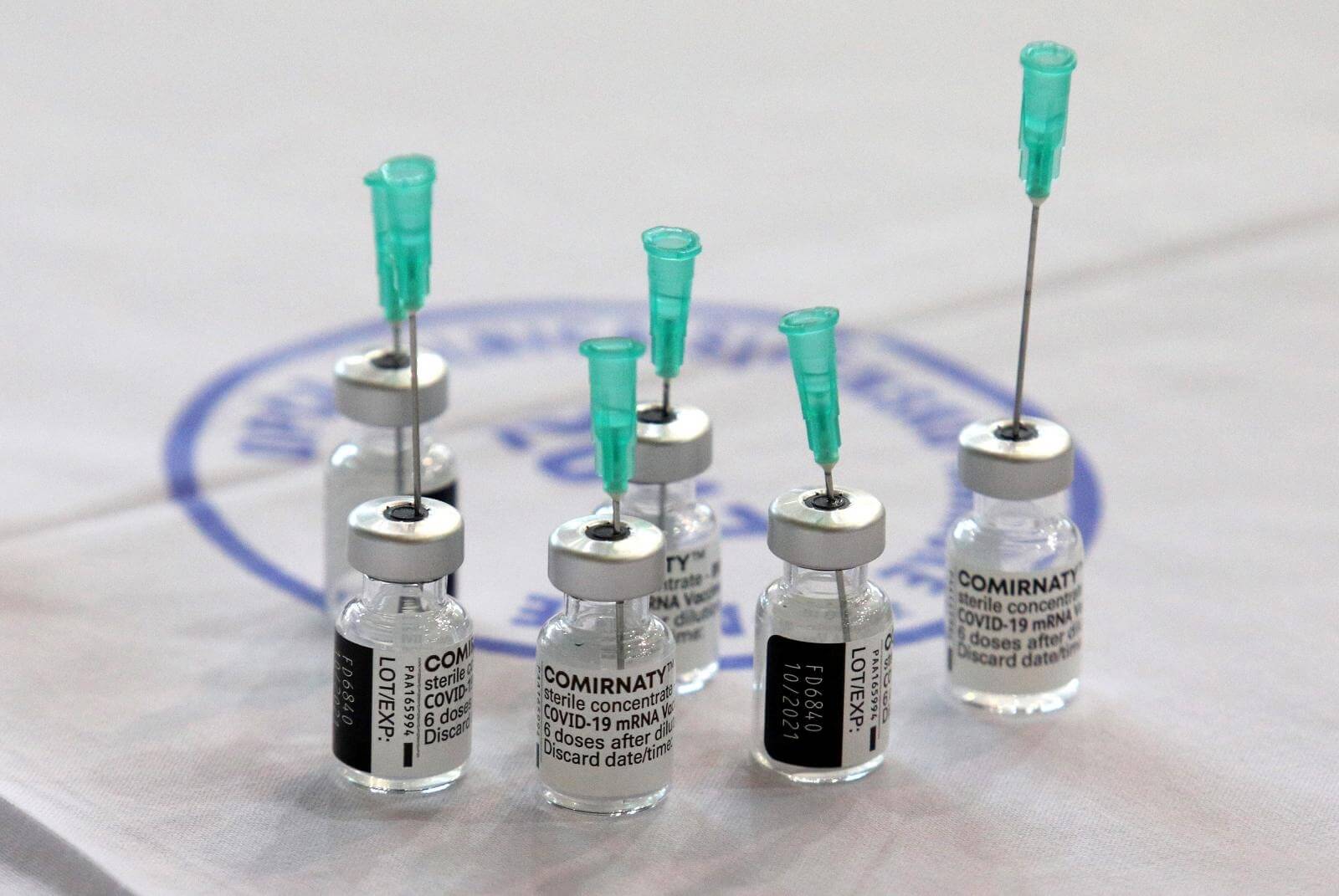
© Dusko Jaramaz / PIXSELL
Highlights of the week: Opposition parties against vaccination being required for job-keeping payments
The Social Democratic Party (SDP) called on Prime Minister Andrej Plenković on Thursday not to make vaccination a requirement for job-keeping payments, while the Most party said business owners were being blackmailed into vaccination.
As TCN reported, SDP leader Peđa Grbin elaborated his dissatisfaction via social networks.
"In Croatia, mandatory vaccination is possible, but the obligation is first established under the law on the protection of the population and then regulated and worked out under Immunisation Rules and the Mandatory Vaccination Programme. The obligation of vaccination can't be imposed in another way, notably not by linking support for entrepreneurs with vaccination," SDP president Grbin posted on Facebook.
"Most is against entrepreneurs, who are being forced into vaccination through blackmail, saving the government's mindless epidemic policy", stated the Most party on its official Twitter account. They added that Croatia was stuck with over 300,000 surplus vaccines because of poor government moves and communication omissions.
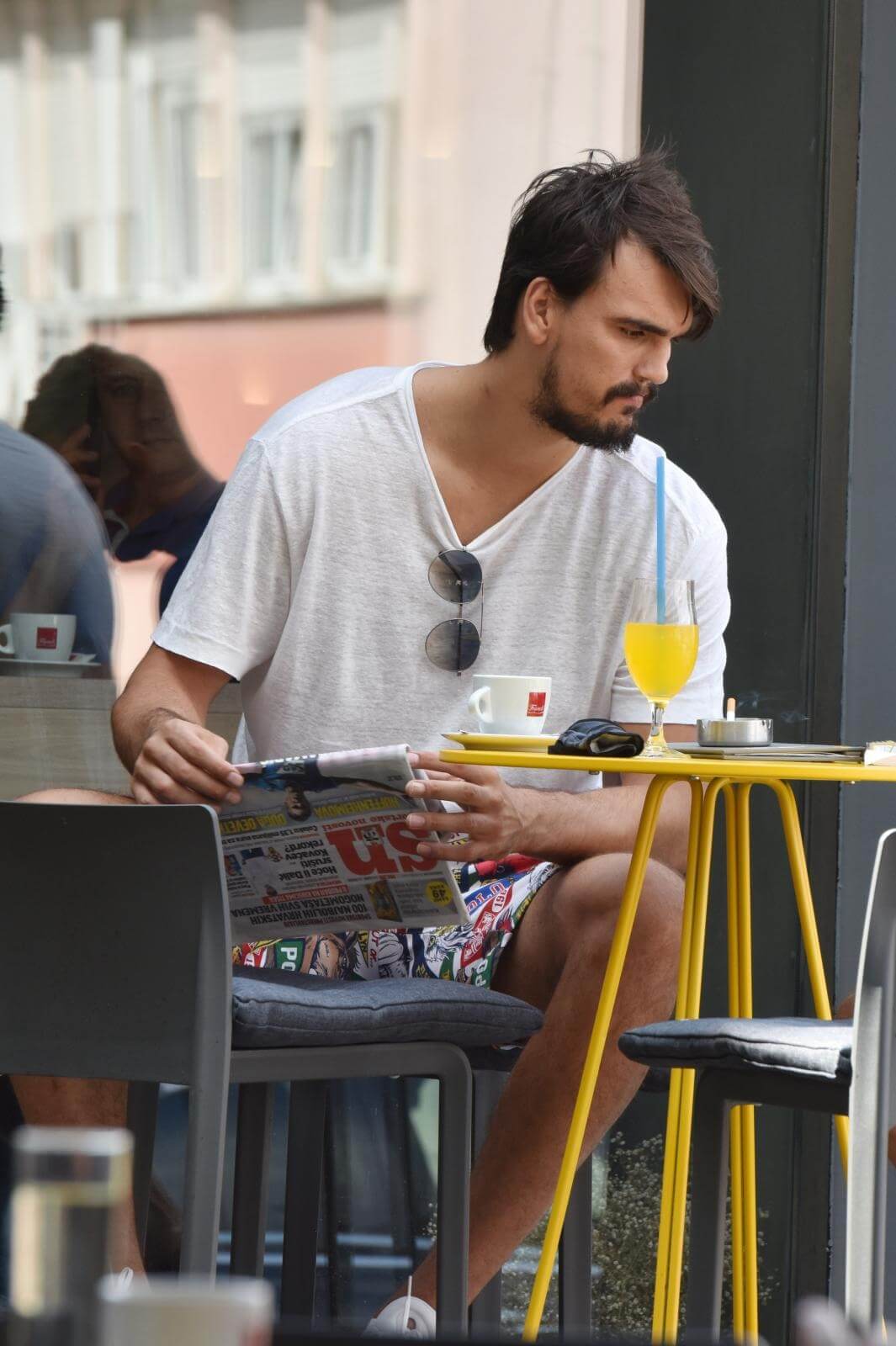
© Hrvoje Jelavic / PIXSELL
Highlights of the week: Dario Šarić becomes 5th Croatian basketballer in the NBA finals
Šibenik's Dario Šarić is the 5th Croatian basketball player to reach the NBA finals! As TCN wrote, Šarić became only the fifth Croatian basketball player in the NBA league finals, joining the company of Dražen Petrović, Toni Kukoč, Žan Tabak, and Ante Žižić. Šarić plays for Phoenix Suns. They topped the Los Angeles Clippers 4-2 in the NBA Western Conference Finals. Apart from basketball, Šarić also likes to enjoy sipping coffee on Šibenik cafe terraces, as portrayed in the photo.
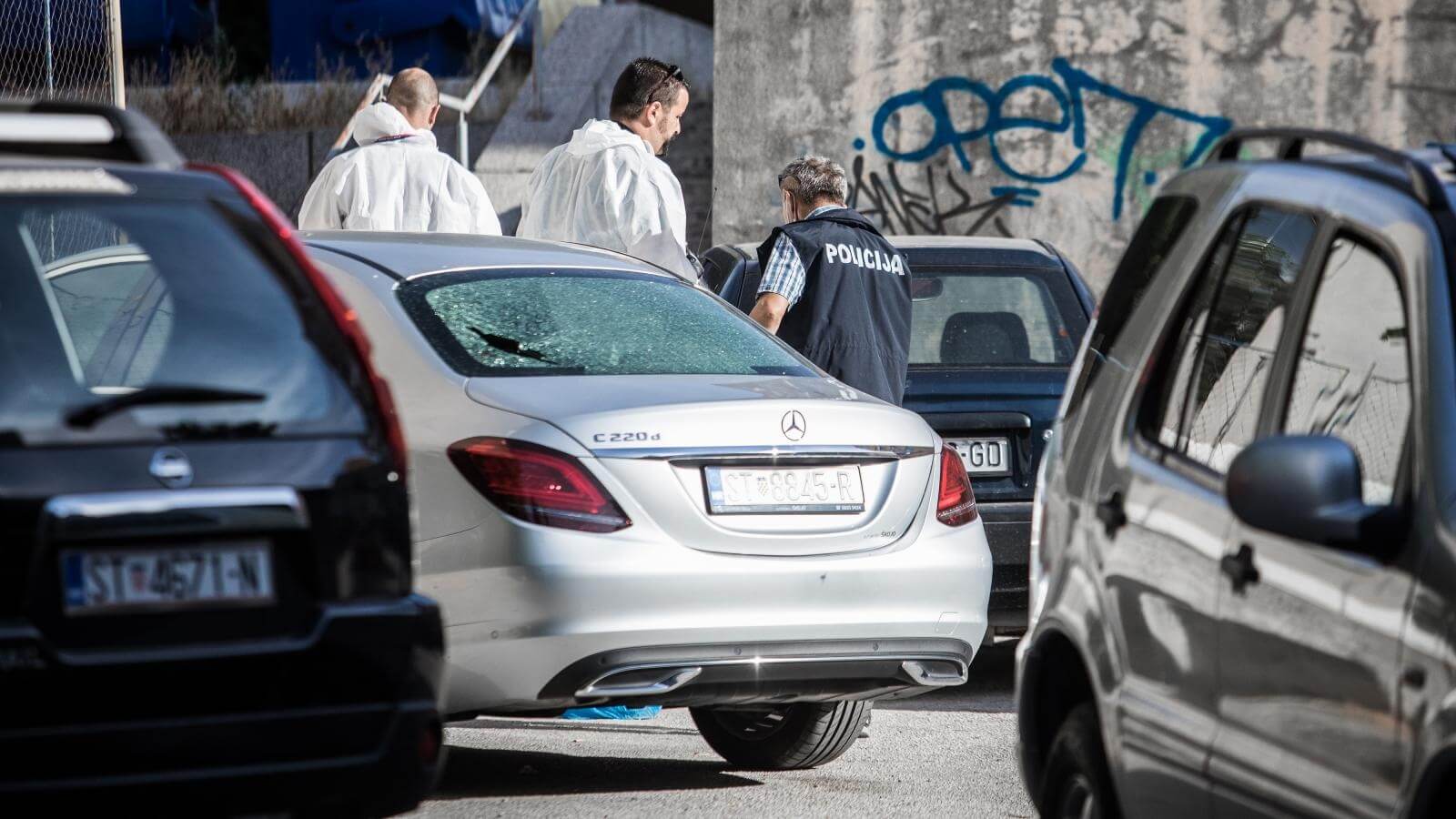
© Milan Sabic / PIXSELL
Highlights of the week: Bomb planted in Split. One person injured
In the night from Thursday to Friday, an unknown person placed an explosive device underneath a vehicle. The explosion damaged six cars, and one person required medical attention. The investigation is ongoing since Friday morning.
To learn more about Croatia, have a look at our TC website.
For more about news in Croatia, follow TCN's dedicated page.
Zagreb County Court Orders Investigative Custody For Mamić Brothers
ZAGREB, 23 June, 2021 - A Zagreb County Court investigative judge decided on Wednesday that Zdravko and Zoran Mamić should be remanded in custody, which once it becomes final, will serve as the basis to request their extradition from Bosnia and Herzegovina, Hina learned from the court.
The remand order was issued due to flight risk and risk of repeating the crime, Judge Krešimir Devčić told Hina.
He added that a panel of judges had upheld an appeal by the USKOK anti-corruption office against an earlier ruling which rejected the custody request. Once today's ruling becomes final it will serve as the basis for Croatia to request that the Mamić brothers be extradited to Croatia from Bosnia and Herzegovina pursuant to an agreement between the two countries that entered into force in 2014, Devčić explained.
On 10 June the investigative judge rejected USKOK's request to arrest the fugitive Mamić brothers because warrants for their arrest had already been issued and custody had been set in other cases against them.
Businessmen to remain in custody, judges released on bail
With regard to the other suspects in this case, the court confirmed on Monday that Osijek County Court Judge Darko Krušlin was released on bail while Judge Zvonko Vekić and Osijek businessman Drago Tadić were still behind bars.
A third suspect, Judge Ante Kvesić, had also been remanded in custody. He did not appeal against the decision and a final ruling has ordered disciplinary action against him, removing him from his judicial duties. As there was no cause to keep him detained, Kvesić was released on bail on Monday.
USKOK launched an investigation into the six suspects for giving and accepting bribes and influence peddling.
Krušlin is charged with accepting an Audemars Piguet watch in exchange for interceding for Mamić during the trial against him before the Osijek County Court.
USKOK said that in the period from April 2017 to 21 May 2019 Zdravko Mamić, at the time an indictee in several cases that also included his brother and other indictees, met with Judge Vekić in Zagreb, Osijek, Banja Luka, Široki Brijeg and Dubai. Mamić gave Vekić a total of at least €370,000 for him and the other two judges.
For more about politics in Croatia, follow TCN's dedicated page.
Dijana Zadravec Presents Her Evidence of Corruption in a Zagreb Hospital
ZAGREB, 15 June, 2021 - The National Anti-Corruption Council on Tuesday interviewed the dismissed head of the radiology ward of Zagreb's Sisters of Charity Hospital, Dijana Zadravec, who presented her evidence of criminal activities used to siphon money from the hospital.
Zadravec, who has been on sick leave since May, told members of that parliamentary body that she learned yesterday from the media that acting hospital director Zoran Vatavuk had given her a warning before dismissal for harming the hospital's reputation, noting that the hospital's reputation was harmed by corruption and those who committed and covered it up.
Zadravec said that her fight against corruption started in 2016, when her persecution and harassment started as well.
She said that as the deputy hospital head she reported in 2016 the charging of fictitious overtime work which the then director Mario Zovak had covered up, adding that she had reported this to the prosecutorial authorities and the Health Ministry.
Zadravec said that in late 2020 she discovered a criminal network at the hospital, with public money being siphoned by doctors, which was why she reported them for abuse of office.
The doctor, who claims to have extensive documentation proving her allegations, says that offers to suppliers with whom the hospital did business without public tenders, since the last public tender was conducted in 2019, were signed by doctors Vladimir Kalousek and Branimir Čule, and that the offers exceeded HRK 30 million.
She also cited cases when less material was used for operations than the quantity ordered from suppliers.
Commenting on Zadravec's allegations, the State Secretary and chair of the Sisters of Charity Hospital Steering Board, Tomislav Dulibić, said that hospital documentation was being checked by inspectors from the health and finance ministries and the HZZO health insurance agency.
"According to preliminary information, no significant departures have been found, except for some minor irregularities. Eleven inspectors are working on this, invite them to testify," Dulibić told the Anti-Corruption Council.
He said that the decision to carry out the inspection at the hospital was made a couple of weeks ago, noting that the relevant proceedings were underway.
The chair of the Anti-Corruption Council, Nikola Grmoja, asked if anyone had responded to Zadravec's claims, to which Zadravec said that after she reported the false charging of overtime work, Health Ministry inspectors were called in and concluded that the matter should be investigated by the hospital director.
Allegations should be investigated as soon as possible
After conducting the interviews today, the Anti-Corruption Council adopted a conclusion asking the ministries of health, finances and economy as well as the prosecutorial authorities and the USKOK anti-corruption office to determine facts related to the case as soon as possible.
Zadravec was told to submit copies of the reports she had sent to the competent authorities as well as the text message in which, she claims, Parliament Speaker Gordan Jandroković lobbied for Zovak's reappointment as the hospital head.
The Anti-Corruption Council will send the audio recording of today's hearing to the prosecutorial authorities, and it will ask the Health Ministry to submit all documents on inspections conducted at the hospital since 2016 or explain why no inspections were conducted.
The Council will also ask the government to secure additional conditions for the employment of financial investigators at courts in four big cities.
For more about politics in Croatia, follow TCN's dedicated page.
Arrested Osijek Judges Sent to Zagreb For USKOK Questioning
ZAGREB, 9 June, 2021 - The three judges of Osijek County Court who were arrested on suspicion of graft on Wednesday morning have been transferred to Zagreb for questioning by the Office for Suppression of Corruption and Organised Crime (USKOK).
According to unofficial information, the judges Darko Krušlin and Ante Kvesić were already brought to the USKOK headquarters, after which judge Zvonko Vekić and businessman Drago Tadić were expected too.
USKOK said the arrests were the result of an investigation conducted in cooperation with the police anti-corruption office (PNUSKOK) and tax authorities. The investigation was prompted by accusations made by former Dinamo football club boss Zdravko Mamić who claimed he had bribed the judges concerned to clear him of the charges of embezzlement of money from that sport club.
The State Judicial Council (DSV) previously launched disciplinary proceedings against Krušlin and Vekić, following a request to that effect by the Osijek County Court, for socialising with Mamić. Mamić fled to Bosnia and Herzegovina a few years ago before the announcement of a trial court ruling in a case in which he was charged with siphoning HRK 116 million from Dinamo.
The judges were suspended in late March pending the completion of disciplinary proceedings, and the DSV at the time also rejected a motion by Mamić's defence to be party to the proceedings.
The arrest of three judges a blow to the court
Osijek County Court president Zvonko Vrban told Hina today that the apprehension of the three judges was "a blow to the County Court in Osijek in terms of its functioning."
The court is going to make technical rearrangements, however, "the reputation of those who work in the court can now be questioned by clients".
Vrban declined to comment on the speculation that Mamić bribed the judges in cash, by paying for their travel arrangements and buying them shoes and clothes to make sure they would acquit him.
Last October, Mamić sent USKOK corruption investigators a USB stick with evidence incriminating the judges. On 16 March this year, after the Supreme Court upheld the trial court sentence against him of six and a half years in prison, Mamić held a press conference in the southern Bosnia and Herzegovina city of Mostar, accusing Supreme Court President Đuro Sessa and judges Vekić and Krušlin of corruption and bribe taking, and calling Osijek County Court president Vrban "a criminal who will be dismissed sooner or later."
Mamić claimed that he had paid Vekić over €500,000, which he was to split with Krušlin and Kvesić.
For more about politics in Croatia, follow TCN's dedicated page.
EU Intellectual Property Office (EUIPO): 7% of Croatians Misled Into Buying Counterfeits
ZAGREB, 8 June, 2021 - Nine percent of Europeans and seven percent of Croatians have been misled into buying counterfeit products, according to a survey released by the EU Intellectual Property Office (EUIPO) on Tuesday.
The study, entitled "European Citizens and Intellectual Property", shows that consumers find it difficult to distinguish between genuine and fake products.
Nearly one in ten Europeans claimed that they were misled into buying counterfeits, but there were considerable differences between EU member states. 19% of Bulgarians, 16% of Romanians and 15% of Hungarians said they were deceived, compared to 2% of Swedes and 3% of Danes.
Croatia was below the EU average, with 7% of its citizens saying they were misled into buying counterfeit products.
According to Eurostat, over 70% of Europeans shopped online in 2020, and uncertainty regarding counterfeit products has become a growing concern for consumer protection, the study showed.
Counterfeit products represent 6.8 % of EU imports worth €121 billion and impact every sector, from cosmetics and toys, wine and beverages, electronics and clothing to pesticides and pharmaceutical products. They pose serious risks to the health and safety of citizens as they usually do not comply with quality and safety standards.
The study says that the worldwide trade in counterfeit pharmaceutical products has been estimated at €4 billion. Digital piracy also represents a highly lucrative market for infringers. Just in the area of internet protocol television (IPTV), €1 billion of unlawful revenue is generated every year by the
supply and consumption of copyright-infringing digital content in the EU, harming creators and
legitimate businesses.
Counterfeiting affects not only consumers, but it also causes considerable damage to the EU
economy, notably small and medium enterprises (SMEs). One in four SMEs and 21.7% of SMEs in Croatia said they suffered damage on account of intellectual property rights infringement, according to the study.
For more about business in Croatia, follow TCN's dedicated page.
Highlights of the Week: 5 Big Events in Croatia from May 31- June 6, 2021
June 6, 2021 - TCN's highlights of the week. A look at the events in Croatia from May 31 through the selection of TCN's reporter Ivor Kruljac.
From significant political changes after the local elections to the losses and preparations in sport, the week was hyped by a strive for hope in Croatia. But, the tragic murder of Nino Čengić in Varaždin was a painful kick to the stomach. Here is another weekly selection of the news depicting the bittersweet life in Croatia.
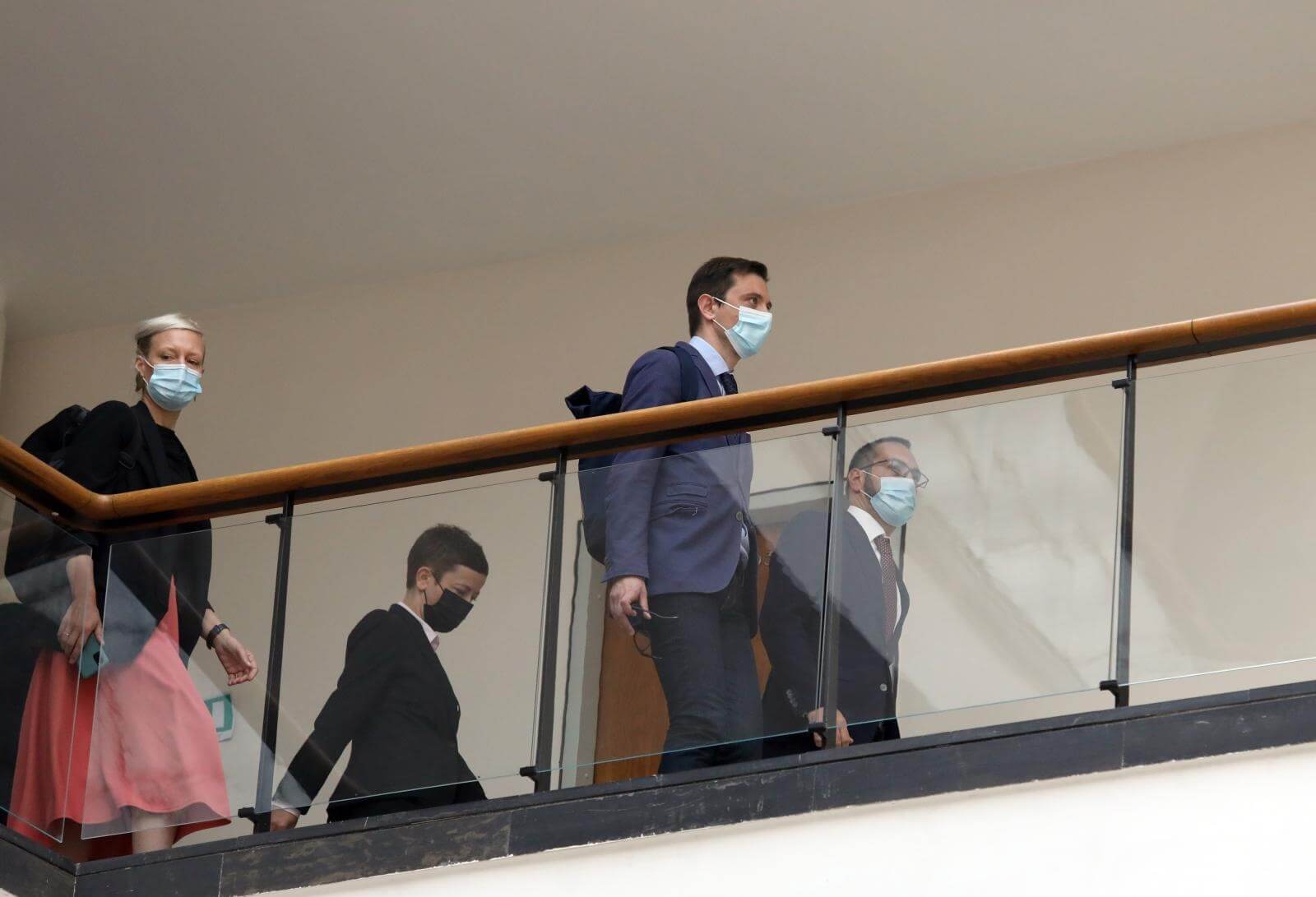
© Patrik Macek / PIXSELL
Highlights of the week: Tomislav Tomašević officially. becomes the new mayor of Zagreb
Zagreb local elections winner Tomislav Tomašević met with Jelena Pavičić Vukičević for an official ceremony of transferring power on Friday, which makes Tomašević officially the new mayor of Zagreb.
Media attention was also caught for the fact that Tomašević was four minutes late to the ceremony because he was waiting for the ambulance on Cibona because a woman fell ill in the middle of the street. But, for the bigger public interest, it's important to note today was the first time for Tomašević to have a detailed view on the financial situation of the City of Zagreb, giving him a clear picture of the debt problem Zagreb has.
As TCN reported earlier, Tomašević told the press after the ceremony that the situation is not good, but there are solutions. Still, so far, no more details were given on the two-thousand-odd-page reports on the 2020 budget execution and preliminary figures. Additionally, the new city assembly would hold the founding meeting on 17 June.
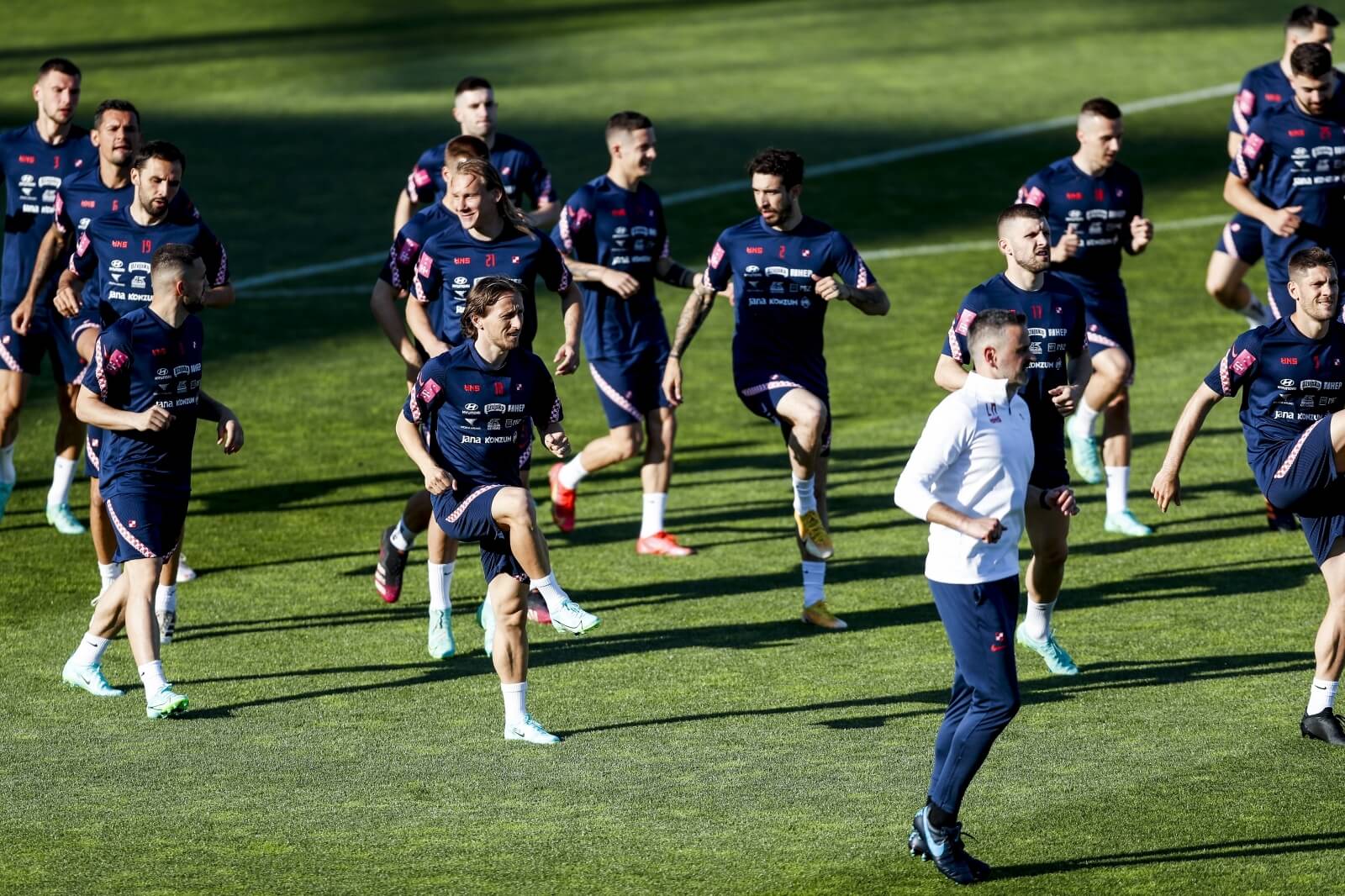
© Slavko Midzor / PIXSELL
Highlights of the week: Zlatko Dalić on Croatian National Football Team
The Croatian National Football Team is preparing for the friendly clash with Belgium. As reported by TCN, Zlatko Dalić faced the press on Friday ahead of the match.
„I am satisfied with everything except the result. We had minor injury problems. We did the rest as expected, but the draw with Armenia left a bitter taste. In that game, we had to win 4-0 or 5-0, not draw 1-1. I am dissatisfied with this result. Plus, we created 5-6 percent chances, and we didn't do that in three games in a row at the beginning of the World Cup qualifiers against Slovenia, Cyprus, and Malta. We were nonchalant and irresponsible and did not realize them. We were not specific, and that is a minus“, said Dalić to the press.
Dalić also pointed out that the national team is aware of its obligation to the Croatian people. He spoke about the problems in the national team, the pros and cons of the draw against Armenia, and the expectations from players who are dissatisfied with their status. One of them is Andrej Kramarić, who, after 20 goals scored in the Bundesliga this season, is not safe among Dalić's starters. A few days ago, he advised the media to ask Davor Šuker what he would say after such a season.
Expectionsare big ahead of the EURO championship, and no doubt fans will pay attention with close interest.
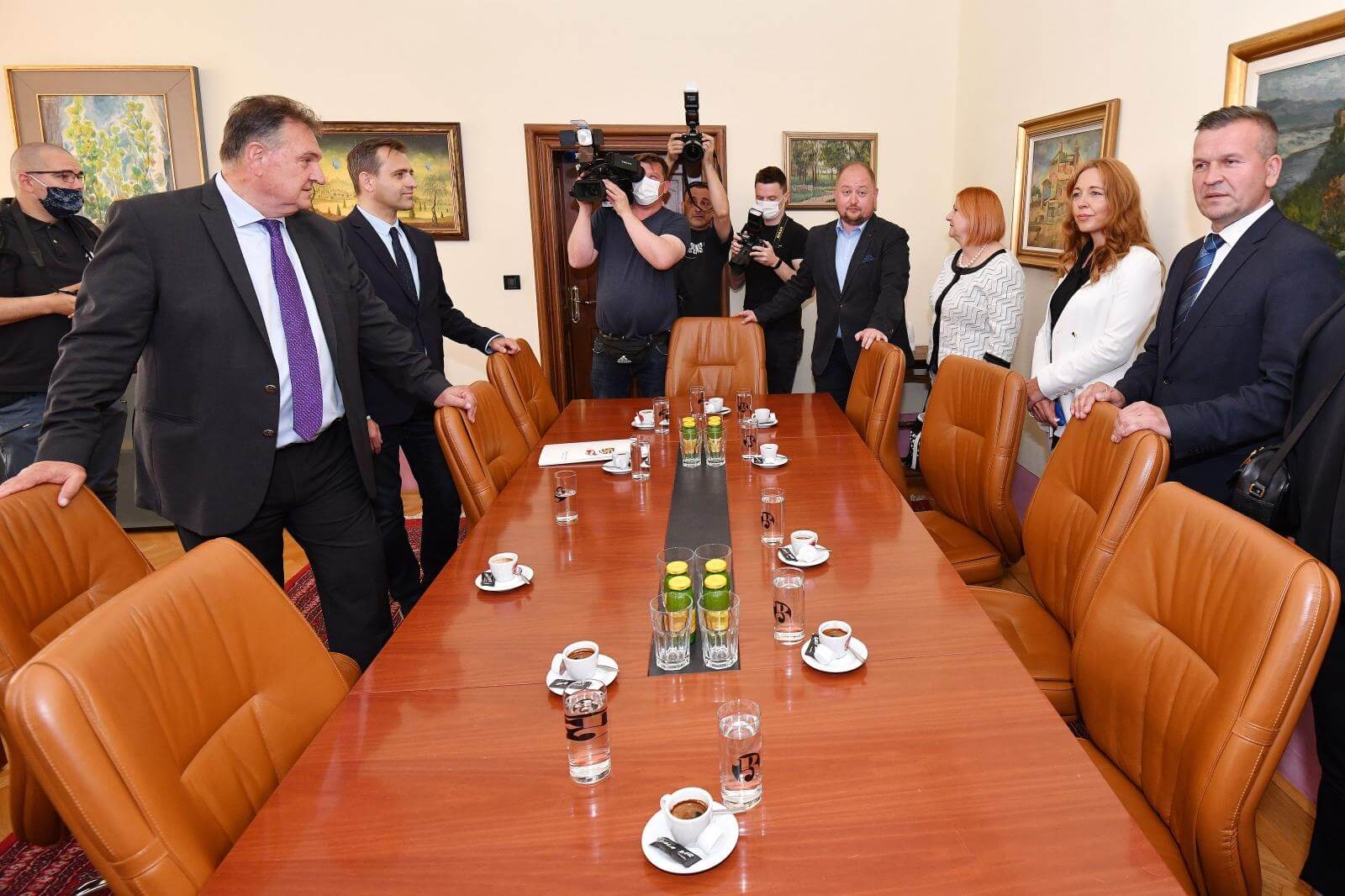
© Vjeran Zganec Rogulja / PIXSELL
Highlights of the week: Anđelko Stričak, new prefect
The power transfer ceremony on Friday also took place in Varaždin where Anđelko Stričak defeated current Varaždin prefect Radimir Čačić.
„The victory is well deserved. In the past nine years as the president of Varaždin county organization of the Croatian Democratic Union (HDZ), and in six years as a member of the parliament, I've been to every corner of Varaždin county and talked to everybody. I heard the needs of our citizens, and I tried to solve them by cooperating with coalition partners on every level. Of course, I'm not the best, most capable or most perfect, but I will try with my team to give my best that everybody in the county feel changes for the better“, said the new Varaždin County prefect Stričak, as reported by Varaždin county's official website.
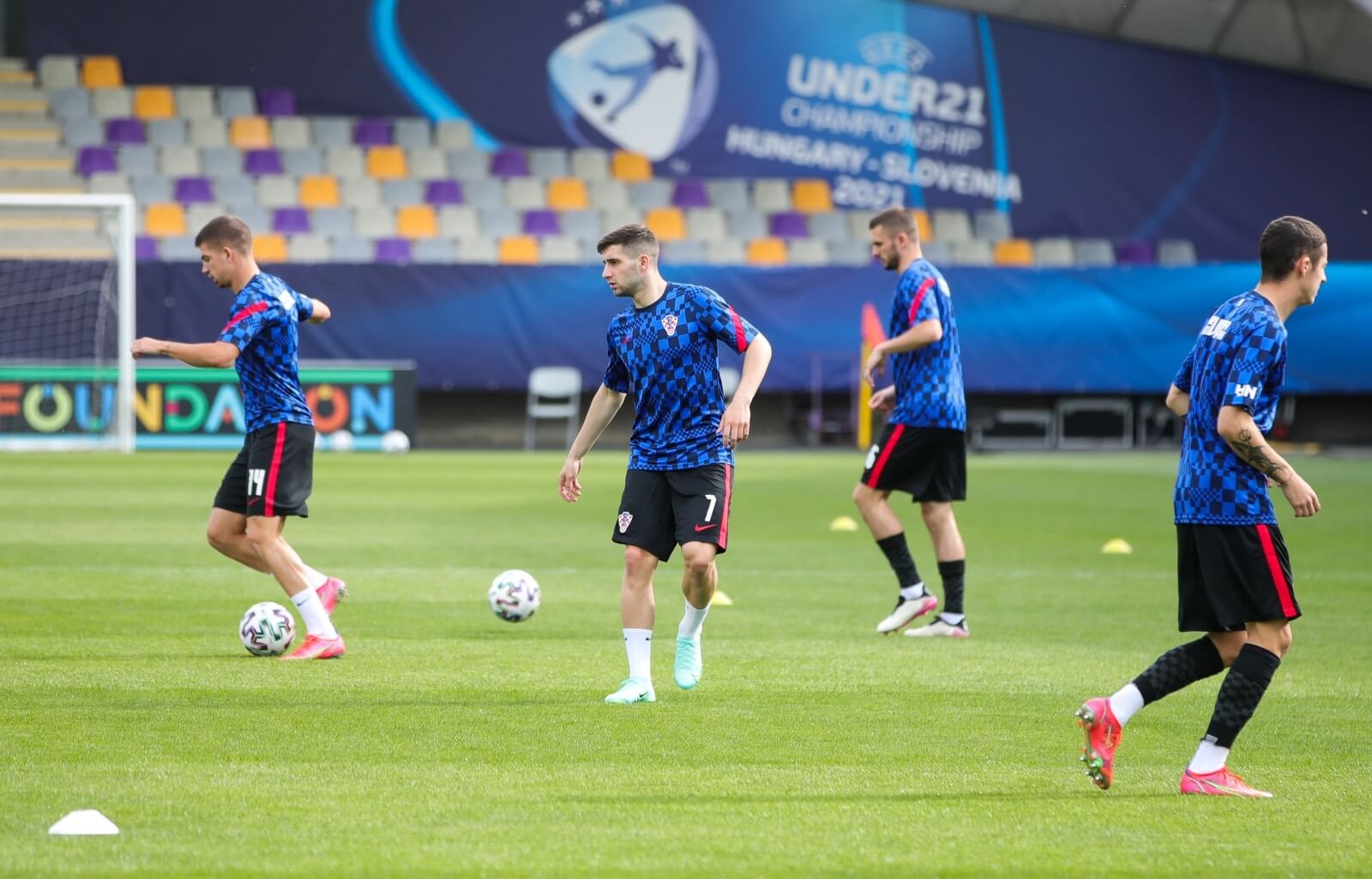
© Sanjin Strukic / PIXSELL
Highlights of the week: Croatia Loses to Spain in the Under-21 European Championship
Spain was better than Croatia after extra time in the Under-21 European Championship quarter-final in Maribor on Monday. The match ended 2:1. As reported by TCN, Croatia was solid in the first half and threatened the Spain goal on a few occasions. Despite Spain's high pressure, Ivanušec had a chance from 20 meters in the 7th minute, and in the 23rd, Bradarić's shot was blocked by the Spain defense. Spain retaliated with a Diaz shot from 20 meters, but Croatia's defense made it difficult for them to do much more.
The young Croatia national team fought against Spain for a spot in the semifinals.
Igor Bišćan's side met Spain at Ljudski Vrt stadium in Maribor.
"The guys are aware that we have a great chance, they are motivated to do something, and we are all around them to give them that chance and be supportive. They have quality," Bišćan announced before the match. 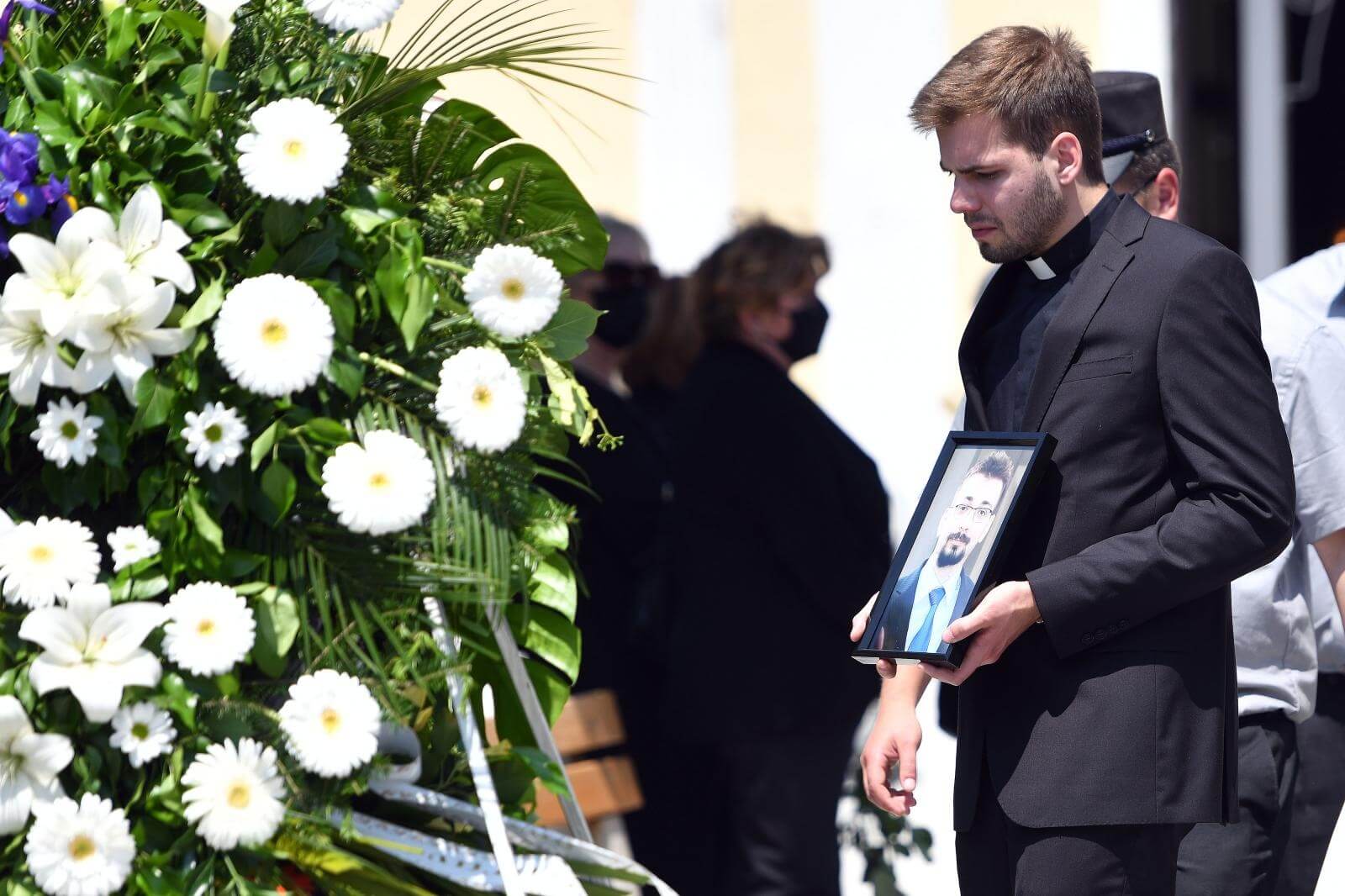
© Vjeran Zganec Rogulja/ PIXSELL
Highlights of the week: Nino Čengić funeral in Varaždin
The Funeral of the English professor Nino Čengić who passed away last Sunday, was held on Wednesday. Nino Gengić, a substitute English professor in one Varaždin school, was brutally beaten with bats and chains in front of the local club in Varaždin called Kulturana. He was 35 years old.
As Jutarnji List reports, four suspects aged 24-29 are currently in custody while the investigation is ongoing as to what lead to this attack. Suspect's apartments were searched, and one suspect illegally possessed a considerable amount of ammo and fire weapons to match. All suspects were previously known to the police for troubling behavior, and the most tragic was the fact that 15 people witnessed the beating, but nobody stopped it.
To learn more about Croatia, have a look at our TC website.
For more about news in Croatia, follow TCN's dedicated page.
Friends of Croatia: Diplomatic Immunity
June 3, 2021 - The seventh article in the series, Friends of Croatia: Diplomatic Immunity brings you more details on diplomatic immunity, its boundaries, and examples of exceptions in accordance with the International Vienna Convention on Diplomatic Relations. Details on how the sentry Ministry of Foreign and European Affairs, are included too.
Being a diplomat isn't bad at all. You get to travel and explore the country you are assigned to, experience the new culture while promoting your own. Additionally, you work on improving bilateral relationships and contributing to the dynamic of the geopolitical scene (hopefully for the better).
Earlier in the series, there was an article dedicated to the key terms of diplomacy. But, there is one more thing that is worth giving special attention to: diplomatic immunity.
You probably might be thinking that means exemption from legal prosecution, and you are kinda right. But that doesn't just mean you can just do whatever you want, and law-abiding behavior is, of course, one of the needed characteristics to fit the job description.
In fact, the International Vienna Convention on Diplomatic Relations from 1961 has very clear instructions.
„The person of a diplomatic agent shall be inviolable. He shall not be liable to any form of arrest or detention. The receiving State (a State in which the diplomat is based) shall treat him with due respect and shall take all appropriate steps to prevent any attack on his person, freedom or dignity“, says article 29 of the Vienna convention. Its also worth adding that the same protection applies for his/her private residence, as well as papers and correspondence, and the diplomatic agent is also not obliged to give evidence as a witness.
But, for not everything to be all benefits and no responsibilities, article 31, despite repeating that „ a diplomatic agent shall enjoy immunity from the criminal jurisdiction of the receiving State and that diplomatic agent „shall also enjoy immunity from its civil and administrative jurisdiction“ – he lists exception. Such as in the event of a real action relating to private immovable property situated in the territory of the receiving State, (unless he holds it on behalf of the sending State for the purposes of the mission) or in the case of an action relating to succession in which the diplomatic agent is involved as executor, administrator, heir or legatee as a private person and not on behalf of the sending State and finally, in the event of an action relating to any professional or commercial activity exercised by the diplomatic agent in the receiving State outside his official functions.
Additionally, „the immunity of a diplomatic agent from the jurisdiction of the receiving State does not exempt him from the jurisdiction of the sending State“.
Ministry at your (diplomatic) service
With the Croatian Ministry of Foreign and European Affairs already stating for this series that they take diplomatic relations very seriously, they respect the convention, and their Diplomatic Protocol Office is here to help. As evident in their protocolar guide, they have an entire section dedicated to privilege and immunity.
„Diplomatic missions and international organizations accredited in the Republic of Croatia notify the Ministry of Foreign and European Affairs, to the Diplomatic protocol arrival of the (diplomatic) mission, attaching the diplomatic note, and the copy of the passport that will be notified“, states the guide in respects to the International Vienna Convention on Diplomatic Relations. The guide adds that when stepping on duty, the Diplomatic protocol will have a view in the passport of a notified person, and it will place a stamp with the following content that will confirm the passport was reviewed by the Ministry. Along with the date and signature to match. This leads to issuing a special identity card that then allows entering the Republic of Croatia without a visa.
„The special ID is issued to the members of missions and consulate offices, members of the UN organizations, and other specialized UN institutions, members of international organizations accredited in the Republic of Croatia, as well as members of their families or members of the shared household and members of private service“, elaborated the guide.
With the aforementioned documents, to get the ID, diplomats must also provide their photos and fill in a questionnaire which can be downloaded from the guide.
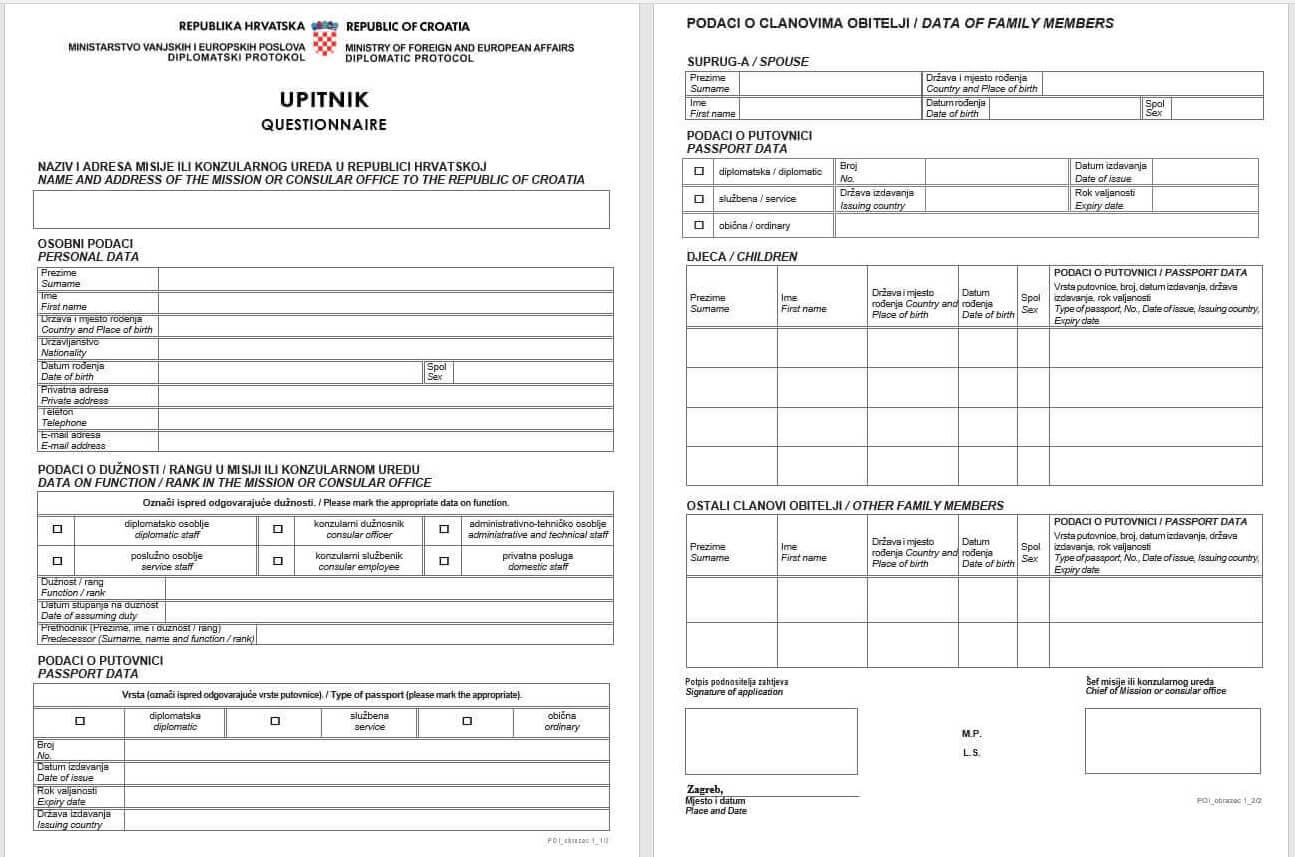
Diplomatic protocol questionnaire/screenshot, Total Croatia News
To read more from the series "Friends of Croatia", follow TCN's dedicated page.
For more about diplomacy in Croatia, follow TCN's dedicated page.


